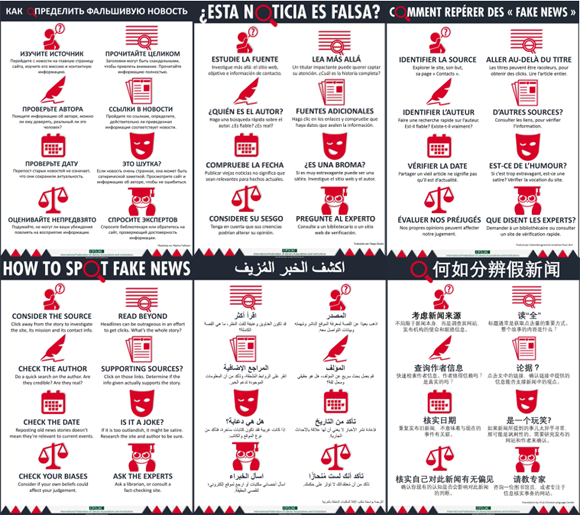Real Solutions to Fake News: How Libraries Help
20 August 2017

Freedoms of access to information and expression online are at risk. The spread of deliberately misleading information risks undermining confidence in the Internet, while heavy-handed reactions from authorities and platforms limit fundamental human rights.
For IFLA, neither of these solutions is desirable. When people are disconnected from the Internet, they risk losing access to the information and ideas that strengthen development and enrichen lives. IFLA developed its infographic on how to spot fake news as a simple yet effective tool to provide an alternative, based on conviction that education provides the best way to give users confidence, and governments no excuse for unnecessary censorship.
IFLA’s infographic has been a big success. It has been translated into 37 languages, and has featured in newsletters, course-packs, and on CNN International. The success was also the result of the creative thinking of information professionals who used the infographics in different ways, tailoring it to local needs.
The Library of the Finnish Parliament introduced the infographic at the Parliament “Committee of the Future” meeting, and it has featured in a number of articles and essays.
In Vietnam, library instructors at the University of Danang used the infographic to impart information literacy classes and share the risks associated with the inability to recognize a piece of news as fake. Information students at the Hochschule der Medien of Stuttgart produced flyers and leaflets inspired especially by IFLA’s infographic, while librarians incorporated the infographic in research articles, newsletters and professional publications.
In Sweden, librarians exhibited translations of the poster in Swedish, English, Arabic, and Romanian at maker party events. Public libraries in Malaysia placed fake news posters near computer terminals in order to grab students’ attention. Georgian libraries shared the infographic with all their Facebook followers.
Find out more about how libraries have used the infographic in this report with examples.
IFLA now encourages its members to engage in discussions on media and information literacy worldwide. We have produced a guide for those interested in drawing more attention to the key role libraries play.
Thanks to the engagement, creativity and enthusiasm of librarians worldwide, the infographic has been a great success worldwide. We look forwards to taking this work to the next level. Great job to all!
Download our How to Spot Fake News infographic and share widely to help protect freedoms of access to information and expression online.